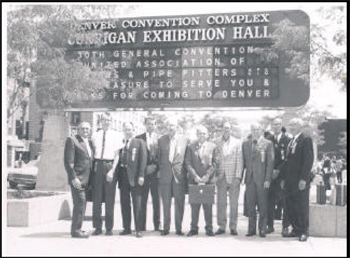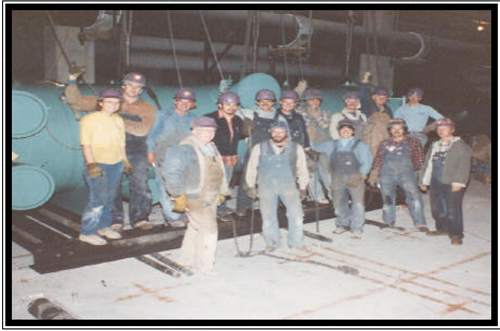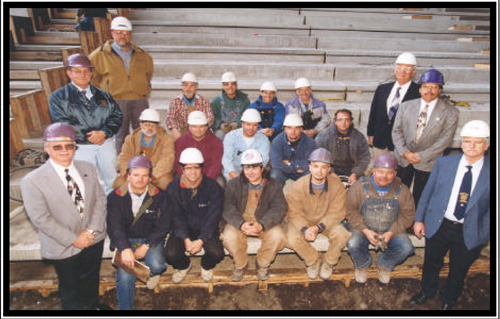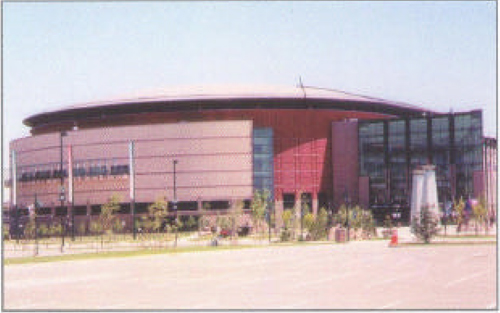History Continued...
Post War Prosperity
With the economy booming and job opportunities plentiful, Local 208 entered a prolonged period of prosperity and progress in the post war era. The Local was also very busy during this time laying some important foundations for the future growth and stability of the local.
One of the important projects the Local was developing at the time was an improved apprenticeship training program. Although the Local’s apprenticeship program can be traced back to 1929, the post war program developed a visionary plan to enhance the quality and utility of the training. In 1947, the Local developed a program with the Emily Griffith Opportunity School. The Local also pioneered some important work on an ambitious plan to begin the “Denver Pipefitters Joint Apprenticeship Training Committee”.
With the advent of a Joint Apprenticeship Committee, Local 208 chartered some new territory by building a dynamic new program to expand its membership base and also increase the loyalty of incoming workers. While this program has taken many years to build and a good amount of energy in negotiating compensation from contractors, the philosophy behind the program is brilliant. The program receives funding through collectively bargained per hour contributions in contracts from contractors, but the program gives the union the primary responsibility to train and accredit incoming apprentices. By retaining control of the education and training of incoming workers, the union builds loyalty and appreciation from workers coming into the pipe trades. This system nurtures solidarity and support between existing members and incoming workers.
At the close of the 1940s, Local 208 was also crafting a strategy to plan for the Local’s growth and development into the future. On April 29, 1949, Local 208 filed incorporation papers for the “Pipefitters Home Association”. The prudent investments and strategies of this association laid the groundwork for the state of the art facilities that now sit on seven and one-half acres the Local now occupies.
From the 1950s to the mid 1970s, Local 208 members enjoyed plentiful work, rising wages and significantly improved benefits. Some highlights during these golden years included:
 In 1971, Denver was privileged to host the national convention of the UA. The last UA convention in Denver was way back 1891, about eleven years before Local 208 received a charter. The president of the national AFL-CIO, George Meany, was a distinguished speaker at the 1971 convention.
In 1971, Denver was privileged to host the national convention of the UA. The last UA convention in Denver was way back 1891, about eleven years before Local 208 received a charter. The president of the national AFL-CIO, George Meany, was a distinguished speaker at the 1971 convention.
Both Pipefitters Local 208 and Plumbers Local 3 shared honors and duties on the Host Committee for the 1971 convention. Members of that committee were:
- In 1972, Local 208 moved into a brand new 18,000 square foot building. Because of the brilliant planning of the union’s Home Association, this facility was designed at the time to serve the membership’s need into the next century.
Local 208
Roy Nylander, Business Manager
Campbell Walker, Business Agent
Local 3
Ray Pfeifer, Business Manager
Paul Emrick, Business Agent
The last quarter of the 20th Century
Although there were some lean years in the early 1970s and the early 1980s because of economic downturns, the last quarter of the 20th Century has been a generally prosperous time for Local 208 members. For the better part of this period, the membership has enjoyed full employment, rising wages, and steadily improving benefits. During this era, Local 208 has played a vital role in making Denver the world-class city it is today. Some notable building projects Local 208 members have worked on during this period include:
- Denver International Airport.
- Denver Public Library.
- Coors Field, home of the Colorado Rockies.
- Invesco Field at Mile High, home of the Denver Broncos.
- The Pepsi Center, home of the Colorado Avalanche and the Denver Nuggets.
New Century, same union
As we enter the 21st Century, the state of the union for Local 208 is sound and secure. Although, like all Americans, Local 208 members were shocked and saddened by the tragic events of September 11, 2001, the union and the nation move forward. Like the proud union workers who rushed to the scene to do their jobs on that tragic day, Local 208 members also know a lot about what it is to be and work union in this country today. There is something about the character of being union that propels us forward in times of tragedy. The character of Local 208 is simply a reflection of the character of the American working class. This character can be summed up in the following manner: Tragedy will strike, but we endure, we learn, we grow and we move forward. We are proud of our union past because we use it wisely to build our future.
The last one hundred years of Local 208 history has taken us through two world wars, one great depression, several recessions, the despicable Taft-Hartley Act and other tragedies as well. Tragedy has stricken, but the Local and our movement have endured.
The past one hundred years has also seen a remarkable transition in the complexion and makeup of the membership of Local 208. It is no longer just brothers, because sisters have rightfully been given the opportunity to join the ranks. Likewise, African Americans, Hispanics and other minorities have been brought into the Local in much larger numbers than the early days of the Local. We learn and we grow, and Local 208 is a stronger union because of it.
The early brothers in the Derby hats and the bowties would be very proud of the membership if they could see it today. They would not recognize the faces or the new tools, but they would know and appreciate the fact that it is still the same union. They would take pride in the fact that their legacy is still alive, because the working class character of Local 208 is still intact. They would understand that the new brothers and sisters learned from their past to build their future. New Century, same union.
 |
| Stapleton Airport 1985—Concorse C Power Plant |
 |
| 1999—Pepsi Center |
 |
The Pepsi Center is home to the Colorado Avalanche hockey team and the
Denver Nuggets basketball team.
|
Previous Page
• Next Page